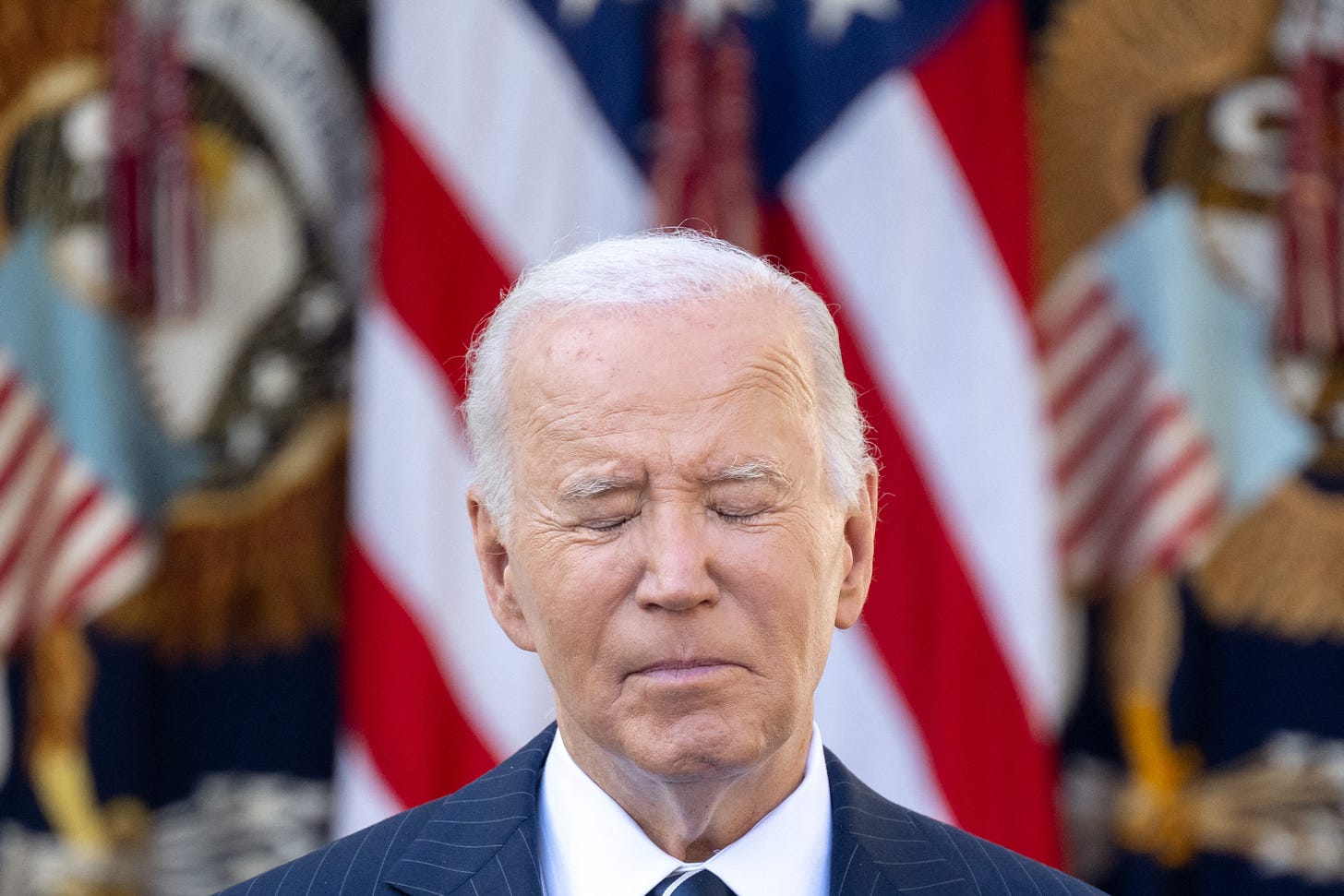
Joe Biden’s Principles of Convenience
The pardon of Hunter Biden is an insult to those who rallied behind the central premise of Joe Biden’s campaigns.

JOE BIDEN RAN IN 2020 on a pretty straightforward idea: “Let’s restore honor and decency to the White House.”
Sure, some voters might not have agreed with him on every policy—or maybe even most policies. But they believed it was worth resisting pressure to fall in line from our longtime party, our lifelong friends, even our family members on the principle that some things matter more than tax rates.
I was one of those voters. I am someone who does not identify as a Democrat and yet has voted for Democrats in the last two presidential elections thanks to my disgust with Donald Trump, my fears at how he would use the levers of power, and my frustration with the party that would select him as its standard bearer once again after he assembled a mob that besieged the Capitol while chanting “hang Mike Pence.”
I’m now one of those people who finds it incredibly vexing not only to see Biden pardon his criminal son Hunter after swearing he wouldn’t but also to see partisan Democrats say, essentially, “Yeah, so what?” On the Secret Pod this week, something Sarah said crystalized why this particular move is also so frustrating—and, frankly, demoralizing—for a lot of us.
“It goes to a couple of very base-level things about both who we are as The Bulwark [and] what it means to somebody who is fighting against Donald Trump for reasons that are bereft of partisanship,” Sarah told JVL. “Some of us, I think, identify as Democrats now. But I think that the sort of loyalty to a party or a partisan interest is not our motivating factor, right? Our motivating, our animating reason for being here is that we do care about, let’s say, norms, values, institutions, those things. And this was something that further sort of tears at the fabric of those things.”
The notion that institutions and values are worth defending is something Biden told us to believe. And he dispensed with those stated values the second they proved inconvenient.
Gawker founder Nick Denton’s key insight into the human psyche is that in our relativistic age, the only modern sin is hypocrisy. I don’t entirely agree with this—there are worse things than hypocrisy! But Biden has, inarguably, acted hypocritically. And in doing so, he has made it harder for those opposing Trump, whose supporters can now point to this sort of thing and say: “Well what do you expect from voters; both sides are equally bad.”
Such an argument may lack comparative moral judgment. JVL’s totally right: Trump has done and will do worse. But in the end, the pardon validates much of the cynicism with our politics when the guy who held himself up as the restorer of honor and decency functionally says “I’ll do what I want, Jack: My debauched heir doesn’t have to play by the rules.”
It also adds to our collective exhaustion. It’s been exhausting to argue with friends and family and former allies about putting principle over policy—because I fundamentally disagree with Biden about a great many policies, though Trump’s own policies aren’t really my cup of tea either—when the people I’m supposedly aligned with make it abundantly clear they don’t actually agree with the principle at stake, that their ethics seem to be just as situational as Trump and his allies always said.
“For those who have to be in the arena making the case against Trump—have four years facing us of fighting everything Trump does—every way in which you remove the moral high ground to do that is difficult,” Sarah said. “You can say, like, ‘It’s not the same’—and it isn’t the same: The ability to weigh these things in importance is an important part of analysis. So in no way are they equal. But still, but still: They make it harder.”
In the end, I’m angered most by the pardon because I fear it is born from my own naïveté. As I put it in The Bulwark slack, what’s frustrating is that Biden saying he wasn’t going to pardon Hunter during the election was kayfabe, and though I suspected it was kayfabe on some level, I hoped it wasn’t. Which means I’m a dumb mark rather than a smart mark, and no one likes to feel dumb.
Regardless: What’s right is right and wrong is wrong. Pardoning Hunter Biden may have been constitutional, it may have been “what any father would do,” it may have been thrilling for people looking to stick it to Trump in some minor way. But it was wrong to do, it’s wrong to defend, and everyone involved in the decision should feel great shame for trying to pass it off as some sort of enlightened attempt to undo an injustice rather than a tired old man’s desire to do what he wants for someone he loves.















